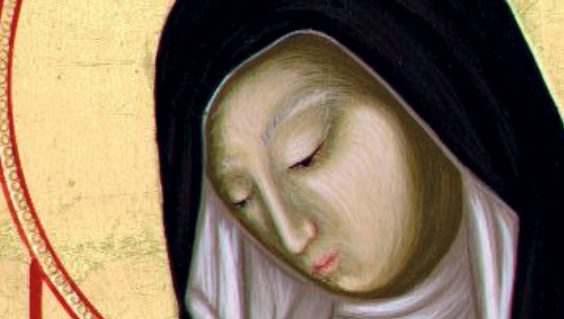Julian of Norwich was not a man, in spite of her name. She was a remarkable woman, also known as Dame Julian, Mother Julian, and Lady Julian. As to what her real name was, we have no idea, although we do know that she was born in 1342 and that she grew up in Norwich, so at least the “of Norwich” part is correct.
This way of referring to her today derives from her association with St Julian’s Church in the medieval centre of the city of Norwich.
Most of the church was built in the 11th and 12th centuries, although it contains some earlier Anglo-Saxon features. Much of it was destroyed by bombing during World War II, then restored in the 1950s.
Lady Julian was a mystic who chose to become an anchoress – a female anchorite, recluse or hermit – and she lived much of her life walled up in a cell attached to the church.
She is famous for having written the religious work now known as Revelations of Divine Love, which represents a very significant step in the
history of the English language – it is thought to be the first book written in
English by a woman. This makes it remarkable in two ways: not only had all books hitherto been written by men, but also religious works were also mostly written in Latin. Her benign, consoling message also went very much against the stern, punitive religious orthodoxy of the time.
Julian made the decision to become an anchoress following her experience of falling dreadfully ill when she was in her thirties. On what she thought was her deathbed, she witnessed her “shewings” and, after returning to full health, she gratefully wrote an account of what she had seen, firstly as a manuscript which is now called her Short Text.
Later, while spending the rest of her days immured in her cell at St Julian’s, she produced a much longer account now known as her Long Text.
A reading of Julian’s original 14th-century Middle English writings is very informative about the extent to which our language has changed over the centuries. The most famous passage in her Revelations runs: “But Jesus, that in this vision enformid me of all that me nedyth, answerid by this word, and seyd: ‘synne is behovabil, but al shal be wel, and al shal be wel, and al manner of thyng shal be wele’.”
In medieval English, behovable meant ‘necessary’ or ‘useful’; all that me nedyth meant ‘everything that I need’, and the plural of thing was thing.
The pronunciation of English has also changed enormously in the past 650 years: Julian would have pronounced all as “ahl”, be was more like “bay” and answerid had three syllables.
Julian’s medieval English text probably sounds more poetic to us today than it would have done to her contemporaries, but, essentially, the message she said Jesus revealed to her in these visions or showings was basically that “everything is going to be all right”.
Fourteenth and 15th-century English-speaking people would surely also have appreciated the simple beauty of her phrasing: “All shall be well and all shall be well, and all manner of thing shall be well.”
NORWICH
Norwich, as any Norfolk person will tell you, is correctly pronounced “Norridge”, rhyming with porridge. Harwich and Greenwich are similarly
pronounced, with the “-idge” ending as Sandwich also was in earlier times.
Swanage, too, was originally written “Swanwich”, but Dorset people wisely
changed the spelling to a form that would discourage outsiders from mispronouncing it




